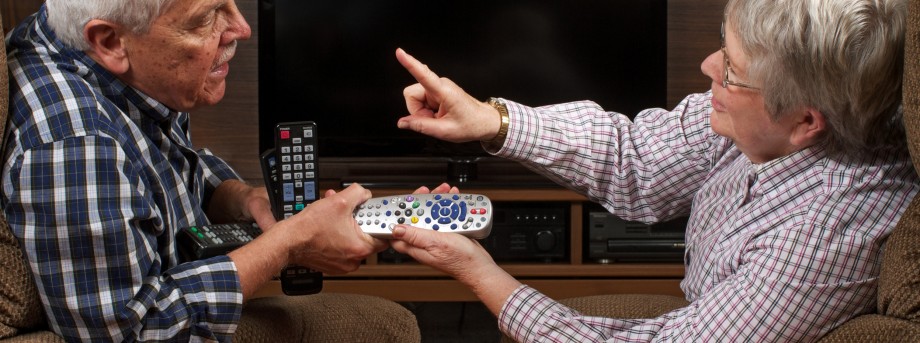The University of Nottingham
 Exchange online
Exchange online
Research Exchange
Smart TV for the ‘third age’

Making our TVs even smarter could be a way of closing the digital divide between the younger and older generations. And volunteers who started out as guinea pigs have become design partners in a research project which has shown that the accessibility of everyday information communication technology (ICT) for the elderly is increasingly due to poor design and not inadequate users.
The MyUI research project, involving Human Factors Research Group (HFRG) at The University of Nottingham and the Nottingham University Business School, is looking at how the next generation of digital interactive TVs, with access to the world-wide web, could be used to deliver valued services to older people in their own domestic environments in ways which they find accessible and appealing.
Prototypes of this new technology have been tested out by residents of the Lark Hill Retirement Village near Nottingham. Two day centres also helped, including Radford Care Group in Nottingham.
Interactive TV appears to be very promising as a vehicle for older people to use to access web-based resources, information and community. The research is continuing to explore the benefits of adaptive interfaces as a way of making technology more accessible for all.
Anne Floyde, a Research Assistant in HFRG, said: “So much technology seems to be designed by the young, for the young. It is clear from our initial results that many older people are currently under-served by technology products, finding many devices completely unappealing or unusable, or ignoring much of the functionality, or in some cases finding them unavoidable but frustrating. Typically, technology and software designers are younger people who may lack an understanding of the challenges faced by older members of our community. Our aim is to create affordable technology which is accessible to all ages and abilities and which enhances the lives of older people.
“Older people are rarely consulted on such matters. We have found that all the encouragement they needed was a supportive environment. We soon discovered the best results came when volunteers were able to test out our technology in a familiar setting, with their normal support structures in place and with no disruption to their routine.”
The MyUI project — is a European Union funded project aimed at increasing and mainstreaming the accessibility of every-day ICT by developing highly accessible life-enhancing technology-mediated services for older people. This includes adaptive interfaces which detect an individual’s requirements — enabling people with age related conditions such as physio-motor, sensory or cognitive impairments to enjoy many of the benefits modern technology can bring.
Steven Britton, Village Facilitator at Lark Hill Village, said: “Lark Hill has a strong volunteering ethos, and also aims for broad community engagement. Many of our residents were happy to help with this research, and found it an enjoyable and worthwhile experience, many volunteering again and again. The group activities and opportunity to chat afterwards over tea and cake were especially welcome.”
Volunteers were asked to carry out simple tasks — such as using email and weather applications on TV screens using hand held devices including touch screens, pointer devices and remote control devices.
MyUI team researcher Rob Edlin-White said: “For older users, the stakes of poor design are particularly high. They may abandon technology altogether if they find it difficult or frustrating to use. So, more suitable age-appropriate measures were introduced into the research programme. With the help of group activities we were able to monitor the response to various tasks played out on specially designed software on Smart TVs.”
The research team employed the use of ‘pop-up’ labs — to create an inner domestic environment to re-create the experience of ‘watching TV at home’. The response to the tasks volunteers were asked to carry out were discreetly recorded via PC data capture, video, audio recording and by hand.
Volunteers will be demonstrating their use of the technology and talking about the ‘digital divide’ at a photocall on Tuesday 18 June 2013 at Lark Hill Village, Clifton, Nottingham, NG11 8BF.
Tags: eqipment, Human Factors Research Group, Nottingham University Business School, older people, retirement, smart TV, third age
Leave a Reply
Other News

Top prize for quantum physicist
A University of Nottingham physicist has won a prestigious medal from the Institute of Physics for […]

Zero carbon HOUSE designed and built by students comes home
Design and construct a low cost, zero carbon, family starter home, transport it to Spain, build […]